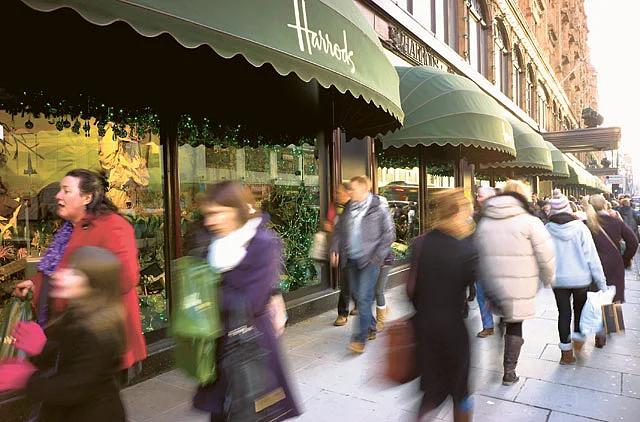London: Their shoppers might be drawn from opposing ends of the retail spectrum, but this has not prevented Harrods, the luxury London department store, and Poundland, the private equity backed poundshop, from reporting record results.
A growing influx of high-spending foreign tourists powered Harrods through the £1 billion (Dh5.8 billion) sales barrier for the first time in the year to January 29, in a coup for Qatar Holding, which splashed out £1.5 billion to buy the store from Mohammad Al Fayed in 2010.
Profits have risen 39 per cent to £108.3 million, according to accounts filed in Companies House on Thursday, and its new owners stand to pocket a £22.7 million dividend.
If the Qataris feel flush enough to mount a shopping spree in their own store, they would struggle to find much on sale for £1 — even a Harrods-branded rubber duck costs £4.95.
At the other end of the economic spectrum it is the promise of value at a fixed price that is attracting growing numbers of shoppers to Poundland.
Revenues
The 327-store chain, which is backed by Warburg Pincus, is serving 3.8 million customers every week as the downturn deepens and has reported a 26 per cent boost in revenues to £642 million.
Whether searching for bling or bargains, the choices both groups of shoppers are making demonstrate the increasing polarisation of the UK retail market. The middle ground is suffering as domestic shoppers trade down for lower prices and international visitors continue to splurge on gloriously impractical luxuries.
In the buzzing atmosphere of the Egyptian Hall, sales of luxury "superbrands" such as Cartier, Chanel and Van Cleef & Arpels are growing at a faster rate than Harrods' overall sales revenues, recording 16 per cent growth in the period, and Harrods is investing to attract more well-heeled shoppers.
"We've had the support of our new owners in continuing to spend at a rate that is really not seen anywhere else in the retail industry," says Michael Ward, Harrods' managing director. He says that £32.7 million was spent on upgrading the store last year, but this will increase "significantly" in the current year.
"Newness attracts new customers," he says.
The Chinese are the top-spending international visitors, according to VAT reclaim data analysis, with the average Chinese visitor spending £3,500 during the course of a store visit.
That more than compensates for a drop in sales to Spanish and Italian shoppers in the same period. Middle Eastern shoppers are the second-highest spending group, and shoppers from Taiwan, Indonesia and several African states also figure highly.
Ward claims that more than 50 per cent of spending comes from local shoppers living within 1.5 kilometres of the Knightsbridge store, which is ringed by the affluent neighbourhoods of Chelsea, Mayfair and Belgravia — though he accepts these areas are dominated by "internationals".
"That particular part of London is driven by international traveller flows, not domestic discretionary spending power, which remains under extreme pressure," says Fraser Ramzan, retail analyst at Nomura.
Pushing boundaries
Enticing customers to shop at Harrods is "all about pushing the boundaries," Ward says, such as the luxury watch room which opens next month. Qatar Holding has funded the opening of six new restaurant spaces in the past year and, increasingly, special events are forming a greater part of the sales pitch.
Ward fiercely contests that his shoppers are bargain hunters, taking advantage of a weak pound.
"Weak sterling is a red herring," he retorts. "Luxury brands will not allow more than a 10 per cent pricing difference between Paris, Milan and London. We've definitely got the best selection, but people don't buy here on pricing."
As if to prove the point, the store has just taken a delivery of £285 champagne sabres — swords designed solely for slicing the top off a bottle of bubbly.
Even Poundland's customers appreciate a touch of luxury. Jim McCarthy, chief executive, reports that he is shifting £1 boxes of Pergale chocolates at the rate of 50,000 units a week.
"When times are tough, an affordable treat is a good thing to be selling."
— Financial Times
Sign up for the Daily Briefing
Get the latest news and updates straight to your inbox
Network Links
GN StoreDownload our app
© Al Nisr Publishing LLC 2026. All rights reserved.
